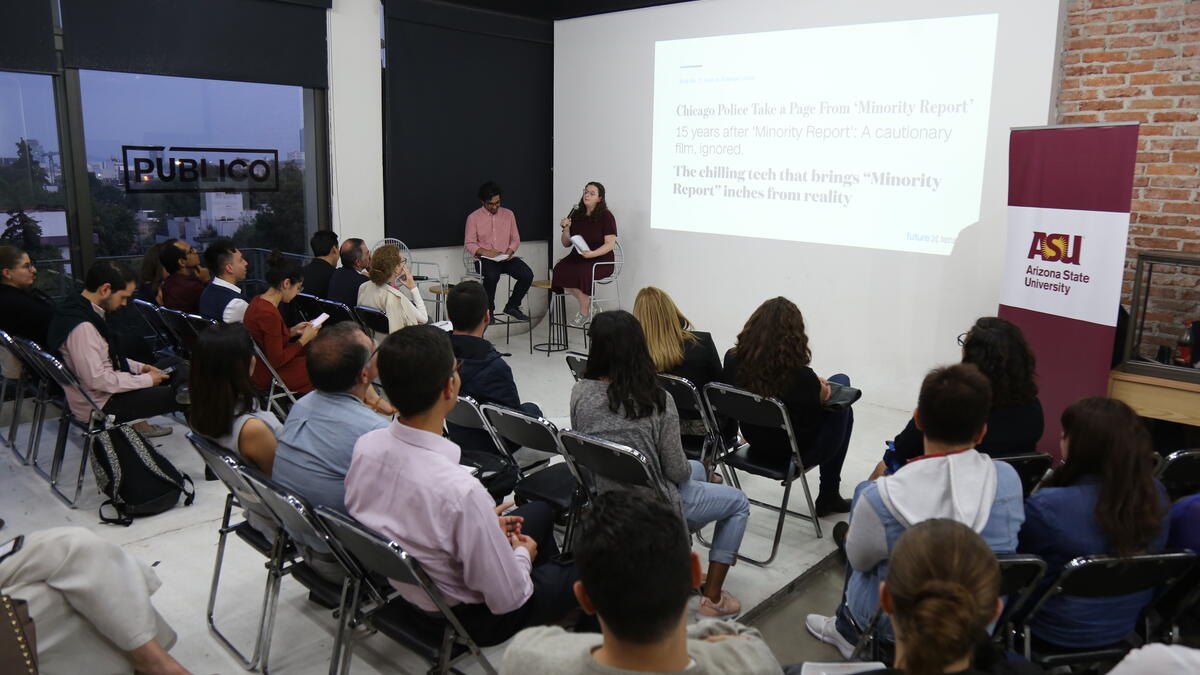When we think about self-driving cars, we don’t usually think about organ donation. But, as Anne Hobson and Ian Adams argued in a 2016 article published in Slate’s Future Tense— a partnership between the magazine, Arizona State University, and the New America Foundation — we should.
About 20% of donated organs come as a result of traffic-related deaths, which tragically claimed more than 34,000 lives in the U.S. in 2017. Self-driving cars promise to reduce that number by taking human error off the road. But as we work to ensure that self-driving technology reaches its goal of saving human lives, we also need to think about solutions to the less obvious consequences that technology’s success may leave behind — such as a reduction in donor organs.
Asking about the less obvious consequences of technology is one of Torie Bosch’s rules for thinking about the future, which she shared with an audience in Mexico City last week. Bosch is the editor of Future Tense and an editor-in-residence and lecturer at ASU’s Walter Cronkite School of Journalism and Mass Communication. She was joined by Pablo Duarte, an editor of the prestigious Mexican magazine Letras Libres, and Alejandro Pisanty, a professor of chemistry at the Universidad Nacional Autónoma de México who is one of the foremost authorities on the Mexican internet. Letras Libres is a partner of Future Tense, publishing its content in translation for its readers in Mexico, Spain and across Latin America.
The event, titled “How to Think About the Future in the Present,” forms part of a series of events hosted by ASU’s Convergence Lab, an initiative that brings together thinkers from ASU and Mexico to explore challenges and opportunities shared across the border.
“Mexico is a great place to be if you care about the future, the present and the past,” Pisanty said, echoing the Mexican writer Carlos Fuentes’ saying that Mexico is a place where all times co-exist.
Both Pisanty and Bosch urged the need to strike a balance between optimism and pessimism about emerging technologies — the kind of balance that allows you to ask the right questions.
Pisanty, who has extensively studied the internet and information security, said that when the internet first started becoming widely used, he and other researchers were “too optimistic about online behavior.” Now, he’s working on creating frameworks to understand that behavior, especially as it moves between online and offline.
Bosch’s other rules include admonitions against making predictions about specific technologies or believing that technology can fix human problems by itself.
Bosch has used these rules in over close to eight years of editing Future Tense, since its founding in 2011. In that time, and through the support of ASU, Slate and New America, Future Tense has explored how emerging technologies will change the way we live through published commentary and its own public events.
The project’s effects have rippled far beyond ASU: About 25% of Future Tense’s readership on Slate (which was founded in early internet days by Bill Gates) comes from outside the U.S. And in addition to Letras Libres, Future Tense is also partnered with publications in Brazil and the United Arab Emirates that translate its articles into Portuguese and Arabic.
The idea is that if — across borders and languages — we all think about the future together, we’ll be able to construct a better one.
Although, Bosch said, there is one problem with thinking about the future.
“The truth is that there is no single the future, it’s a limitation in English ... the future isn’t a fixed destination,” Bosch said. “Every day we all make decisions that lead toward the future where we will arrive. And some of our decisions matter more than others, some people’s opinions matter more than others. And that’s the point of Future Tense, is to try to democratize these conversations.”
Sign up for newsletters from Future Tense. To stay updated on ASU’s activities in Mexico, follow us on Twitter and Facebook.
Top photo: ASU hosts an event on technology and the future in Mexico City on Thursday, April 4. The event featured a presentation by Torie Bosch, the editor of Future Tense, a collaboration between ASU, Slate Magazine and the New America Foundation that explores how emerging technologies will change the way we live.
Written by Mia Armstrong
More Science and technology
Largest genetic chimpanzee study unveils how they’ve adapted to multiple habitats and disease
Chimpanzees are humans' closest living relatives, sharing about 98% of our DNA. Because of this, scientists can learn more about human evolution by studying how chimpanzees adapt to different…

Beyond the 'Dragon Arc': Unveiling a treasure trove of hidden stars
NASA's James Webb Space Telescope (JWST) has set a new milestone: capturing images of over 40 individual stars in a galaxy so distant that its light has traveled since the universe was only half its…

ASU selected as home and partner for CHIPS and Science Act-funded national facility for semiconductor advanced packaging
Following a week where a spirited effort by the Sun Devil football team captured the nation’s attention in the Peach Bowl, it is Arizona State University’s capability as a top-tier research…
